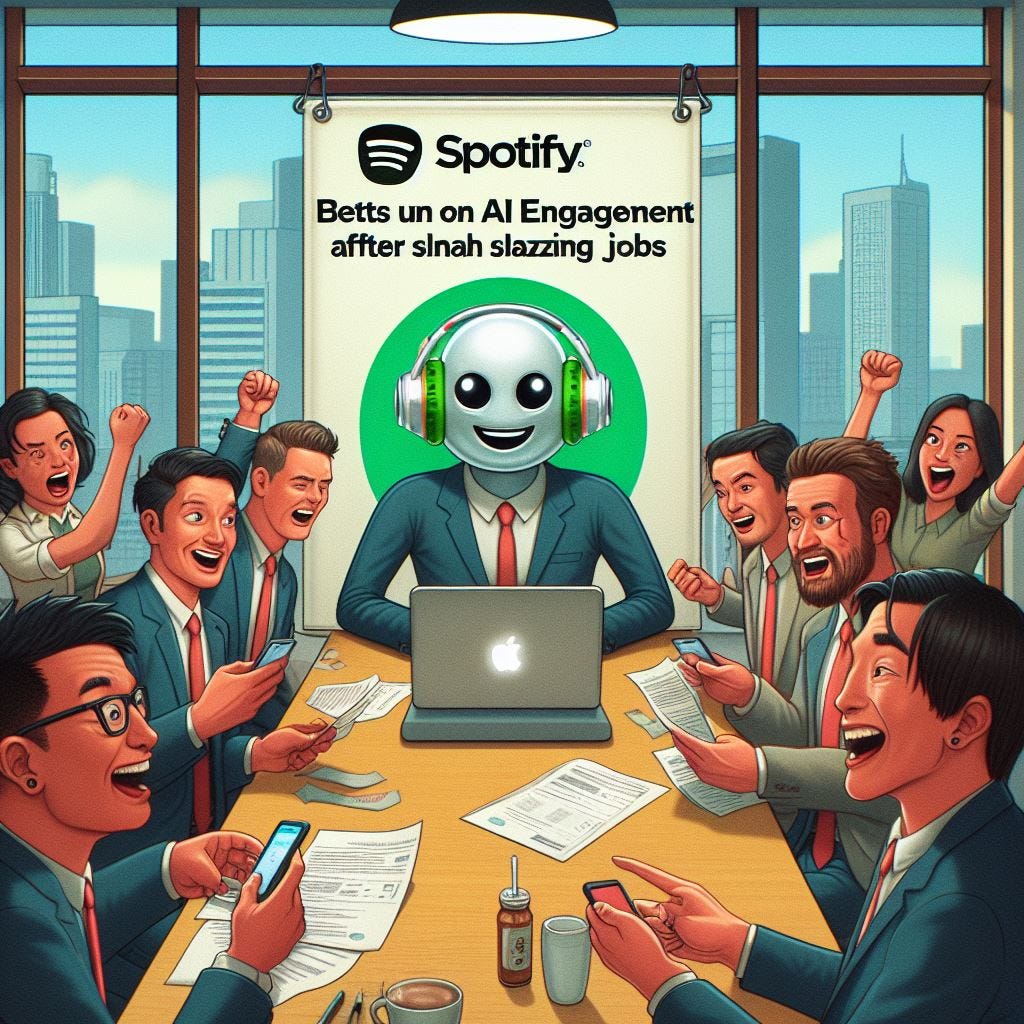Firms Bet Billions on AI Amid Deepfakes, Toxicity Warnings, and Layoff Headwinds
Firms Bet Billions on AI Amid Deepfakes, Toxicity Warnings, and Layoff Headwinds Synthetic media and unchecked models divide tech - yet data personalization and virality prospects attract record fundi
AI Deepfake Nude Services Skyrocket in Popularity
- Social media analytics firm Graphika found a 2,408% annual increase in referrals promoting AI-powered "undressing" services that create fake nude photos/videos without consent
- Services enabled by open-source AI image generation models that realistically remove clothing from images of real people
- Targets predominantly women and girls; enables potential harassment, sextortion, child exploitation
- Major platforms trying to limit visibility but no laws prohibit fake AI nude creation currently
Mistral AI Banks $415M Betting on Open-Source AI
- Paris-based startup Mistral AI raised $415M at $2B valuation after just 7 months
- Building large language models (LLMs) to power chatbots and other AI apps
- Committed to open-sourcing its LLM technology for free public use
- This counters stance of AI leaders like OpenAI arguing uncontrolled LLMs risk toxicity
- Top VC firm Andreessen Horowitz led funding round
- Aligns with French government goals to challenge US tech giants in leading AI field
Spotify Bets on AI to Boost Engagement After Slashing Jobs
- Spotify laid off over 2,000 employees in 2022 while increasing AI investments
- Company pioneered personalized playlists powered by acquiring AI specialist The Echo Nest
- Expanding approach into podcasts/audiobooks via Google Cloud partnership
- Leveraging Vertex AI for content recommendations and OpenAI's Whisper for translations
- Aims to attract more subscribers and reduce churn through improved personalization
- Wall Street reacts positively to cost savings from layoffs funding productivity innovations like AI
Spotify Bets on AI to Boost Engagement After Slashing Jobs
Audio streaming giant Spotify laid off 6% of its workforce this week, totaling over 2,000 jobs cut in 2022. The move aligns with other tech firms tightening belts amidst economic cooldown. However, Spotify simultaneously plans major investments in artificial intelligence (AI) to drive user engagement. The company expects AI personalization and content discovery to increase subscriptions and reduce churn.
Spotify pioneered a hyper-personalized model fueled by acquiring AI specialist The Echo Nest in 2014. Algorithms analyze musical attributes and listening patterns to generate customized playlists like Discover Weekly. Now Spotify is expanding this approach into podcasts and audiobooks via a partnership with Google Cloud leveraging its Vertex AI.
The company also utilizes OpenAI's Whisper for translating podcast transcripts. Improved recommendations and translations could attract more listeners. But some experts note possible pitfalls around accuracy, privacy, and computational expense.
Nonetheless, Wall Street cheers Spotify redirecting savings from layoffs into areas like AI. The stock recently rebounded over 30% on optimism for innovations that charm users. Spotify likely hopes machine learning can orchestrate as profitable an ensemble as its signature human-curated playlists.
The Promise of Synthetic Data for AGI
As AI models grow more powerful, they require ever-increasing amounts of high-quality training data. However, human-generated data is limited - by some estimates all text produced by humans could fit on a single hard drive. This is where synthetic data comes in.
Synthetic data is artificially generated to mimic real-world data. It can be produced at scale by having AIs like GPT-3 write textbooks, generate code examples, or create simulated robotic demonstrations. The key benefit is that synthetic data removes constraints around privacy, bias, and cost that exist with human-sourced data.
Recent research shows that synthetic data can boost AI performance. Microsoft’s F1 code generation model achieved a 5x boost in proficiency from training on synthesized programming textbooks. Anthropic’s Constitutional AI technique uses carefully tailored synthetic data to enhance reasoning abilities. And Nvidia’s Mimic platform leverages simulation to create endless robotic task demonstrations from just a few human examples.
As AI pioneer Richard Sutton’s “Bitter Lesson” states, long-term progress in AI favors brute-force computational approaches over solely embedding human knowledge. Synthetic data generation allows for infinite scaling while adapting to new domains. Leading AI experts predict synthetic data will fuel the next major leaps towards artificial general intelligence.
Rather than hitting limits around human data, synthetic data paves the way for recursive self-improvement. With enough data, future AIs could learn from their own experience, constantly enhancing and expanding their knowledge. The ultimate promise is an AI that thinks and learns like a human, but at digital scale. If current trends hold, mimicking human data may soon give rise to systems that surpass human capabilities across nearly every measure.
AI-powered apps surge in creating fake nudes without consent
A disturbing new industry has emerged with the advent of open-source artificial intelligence (AI) tools that digitally remove clothing from images of real people. Social media analytics firm Graphika recently analyzed the rapid growth in websites and apps providing non-consensual intimate imagery generated by AI.
Referrals on sites like Reddit to services that offer to “undress any girl you want” using AI skyrocketed over 2400% in the past year. The technology behind this is AI image diffusion models which can realistically synthesize nude photos or videos of clothed individuals without permission. These simulated nudes are often chillingly lifelike.
Targeted subjects are predominantly women, though both genders face potential exploitation. Graphika warns that easy access to realistic AI-faked nudity raises alarms around harassment, sextortion, and manufacturing child sexual abuse material. Already AI deepfakes of underage girls have appeared in Europe and sextortion scams using faked explicit media have risen in the US.
While major platforms are attempting to limit search visibility, no laws currently prohibit the creation of AI-enabled fake nudes. Their growth continues unchecked. One site brazenly advertises “Undress Any Girl You Want.” Critics argue legal protections and accountability measures have failed to materialize commensurate with the pace of technological misuse. They urge lawmakers to regulate the industry before societal norms acquiesce to virtual victimization as commonplace. For now, all-too-real harm still results from counterfeit photos that strip subjects of consent along with clothing. The only thing fake is any assumed right to digitally undress strangers for sport.
Mistral AI Banks $415M Betting on Open-Source A.I.
Paris-based startup Mistral AI raised $415 million in a funding round valuing the company at $2 billion, despite being only 7 months old. Mistral builds large language models (LLMs) to power chatbots and other AI applications. The tech world is captivated by LLMs due to chatbot ChatGPT's viral success.
What makes Mistral stand out is its commitment to open-sourcing its LLM technology. Releasing the code freely allows anyone to use and modify it. This aligns with web pioneers like Linux and TensorFlow that championed open source. However, AI leaders OpenAI and Google argue freely available LLMs risk enabling disinformation and toxic content.
Mistral's founders left top research roles at Meta and DeepMind to make open-source AI their mission. Top VC firm Andreessen Horowitz led the record funding round. The French government also endorses Mistral as an opportunity for Europe to compete with U.S. tech titans in commanding the AI future. Mistral just open-sourced its latest LLM model, claiming performance on par with Meta’s. The startup embodies clashing views on the promise and perils of democratizing uncensored AI. Its swelling coffer shows investors still hunger to back audacious visions.







